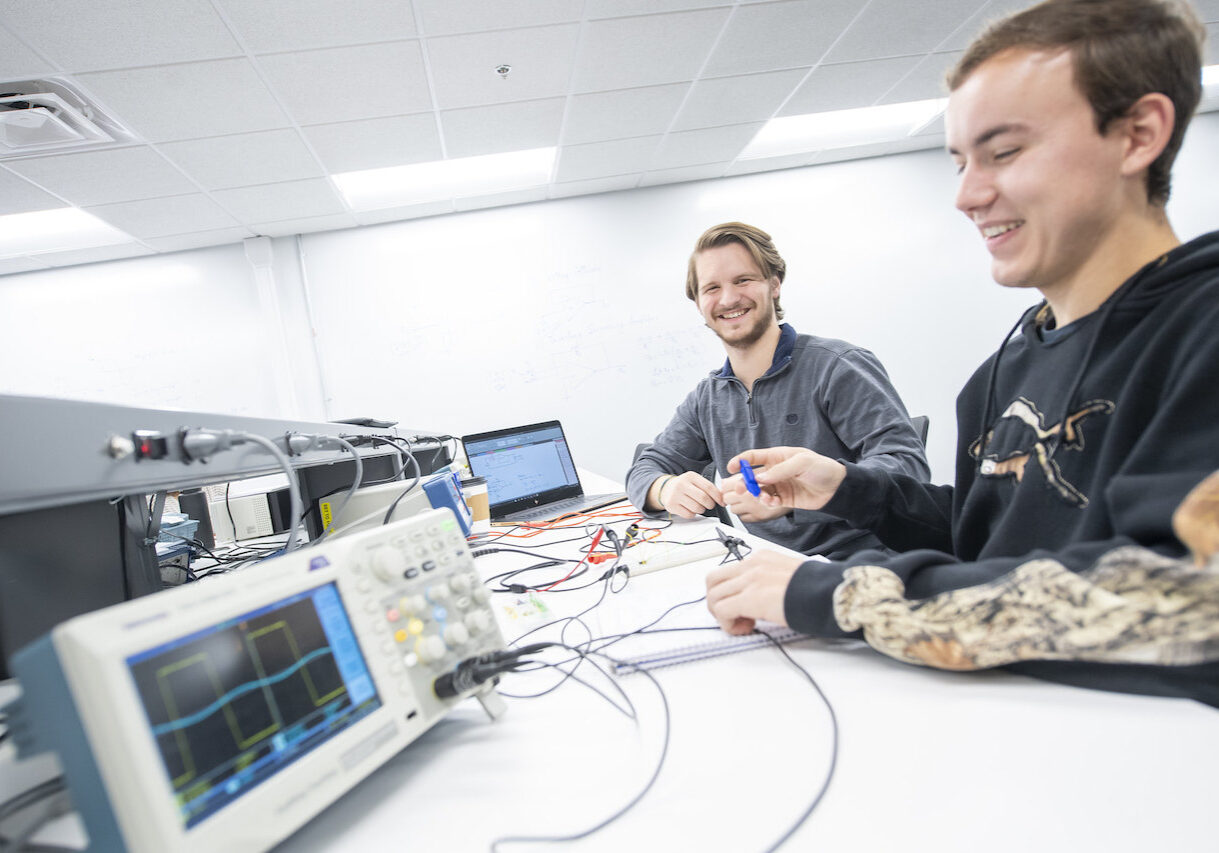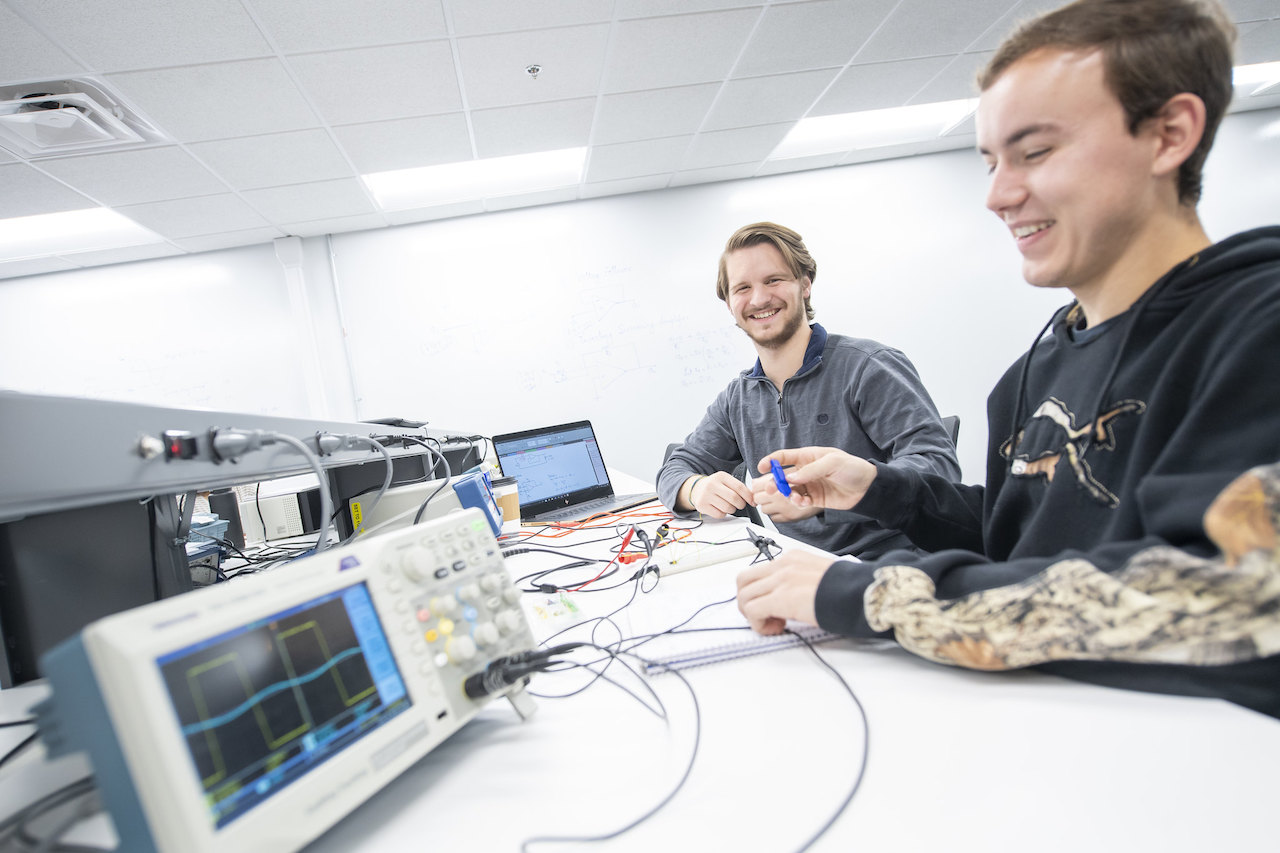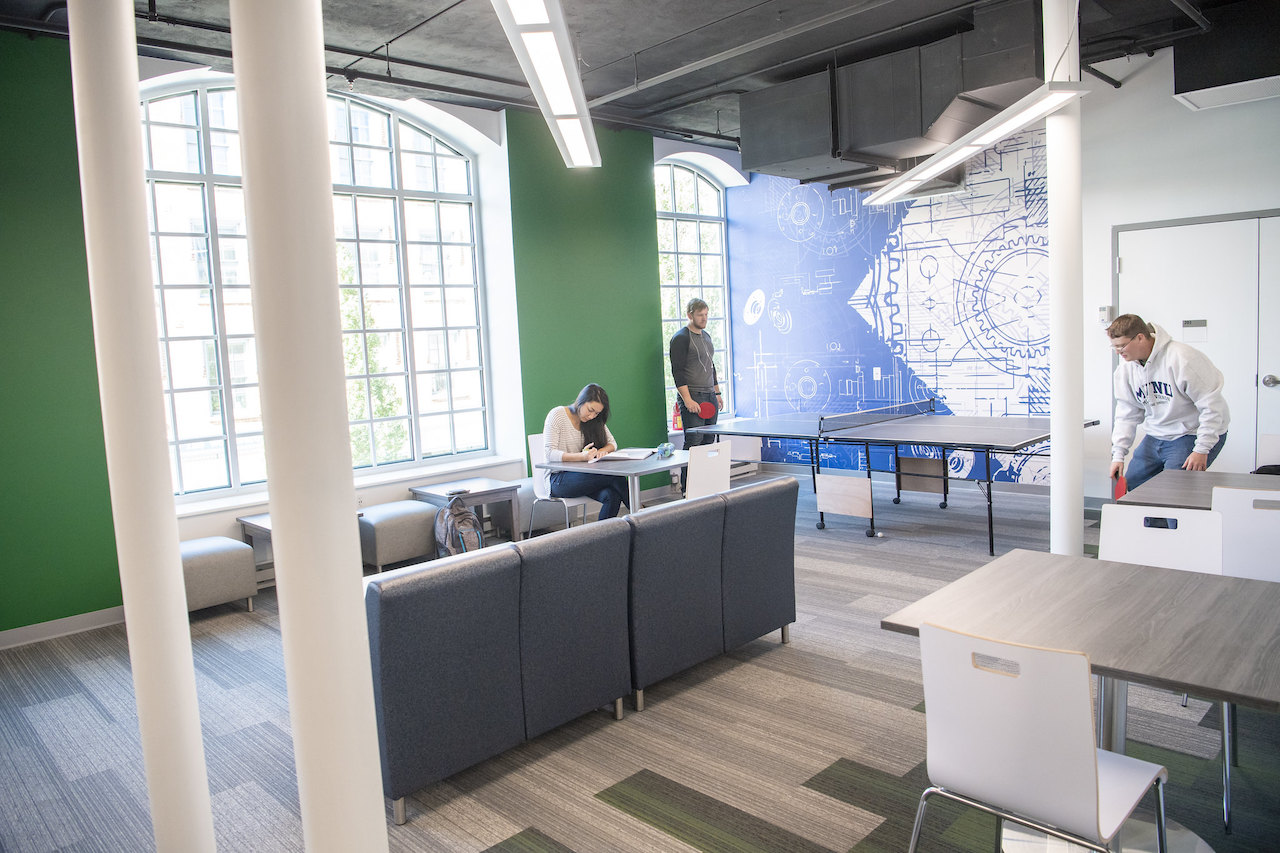Bachelor of Science (BS) in Engineering
Engineering is a rewarding discipline with a variety of exciting occupational possibilities. Because we live in a world of ever-changing technology, skilled engineers are a staple of almost every sector of the economy. If you have an inquisitive, creative mind and love solving problems, the engineering program at MVNU is for you! It will equip you for a fulfilling career serving others.
MVNU’s rigorous coursework, supportive expert faculty, and state-of-the-art facilities and equipment will provide you with a solid foundation to build a successful career in engineering. As an engineering student, you will not only be equipped with state-of-the-art knowledge and skills in engineering but also a Biblical worldview that will prepare you to fulfil God’s calling. The engineering program provides a holistic, Christ-centered education that prepares graduates for vocations defined by service to others.
You can complete your Bachelor of Science degree in Engineering in Mechanical, Electrical or Computer engineering concentrations.
MVNU's engineering B.S. degree is accredited by the Engineering Accreditation Commission of ABET, https://www.abet.org, under the commission's General Criteria and Program Criteria for Engineering, General Engineering, Engineering Physics and Engineering Science
Mechanical Engineering Concentration
Mechanical engineering applies material science, physics, and mathematics to the design, analysis, and implementation of mechanical, fluid, and thermal systems. Mechanical engineers use core concepts in thermodynamics, fluid mechanics, kinematics as well as utilize tools such as computer-aided design (CAD) and modeling to develop real-world solutions to complex problems in heating and cooling systems, manufacturing plants, and industrial machinery.
Computer Engineering Concentration
Computer engineering utilizes principles from computer science and electrical engineering to create hardware (physical components) and firmware that are used in a wide range of areas, including computer system design, medical devices, communication systems, self-driving cars, consumer electronics, and more.
Electrical Engineering Concentration
Electrical engineering applies the concepts of circuit analysis, digital systems, electromagnetic waves, automatic controls, signal processing, analog electronics, and communication systems to solve problems in diverse fields, including modern electronics, electric power systems, radar systems, robotics, and more.
Program Educational Objectives
The program educational objectives for the general engineering program are to educate and prepare students to honor God with their lives by being ethical, productive, and contributing members of society. Within three to five years following graduation, we expect the following.
- Graduates will successfully formulate and solve complex technical problems in multi-disciplinary team-based environments.
- Graduates will display a broad knowledge and understanding of engineering concepts.
- Graduates will effectually apply engineering design principles and generate innovative solutions to meet societal needs.
- Graduates will display excellent communication skills with peers, clients, management, and the public.
- Graduates will be lifelong learners demonstrating professional leadership and be characterized by a high standard of ethics.
- Graduates will display an understanding of service-learning and thereby demonstrate a willingness to assist in meeting the needs of their communities, locally, regionally, or globally.
Engineering Program Student Learning Outcomes
The courses and curriculum of the engineering program are designed to achieve the following student outcomes.
Students in the general engineering program at MVNU will demonstrate:
- an ability to identify, formulate, and solve complex engineering problems by applying principles of engineering, science, and mathematics;
- an ability to apply engineering design to produce solutions that meet specified needs with consideration of public health, safety, and well-fare, as well as global, cultural, social, environmental, and economic factors;
- an ability to communicate effectively with a range of audiences;
- an ability to recognize ethical and professional responsibilities in engineering situations and make informed judgments, which must consider the impact of engineering solutions in global, economic, environmental, and societal contexts;
- an ability to function effectively on a team whose members together provide leadership, create a collaborative and inclusive environment, establish goals, plan tasks, and meet objectives;
- an ability to develop and conduct appropriate experimentation, analyze and interpret data, and use engineering judgment to draw conclusions;
- an ability to acquire and apply new knowledge as needed, using appropriate learning strategies;
- a commendable character based on biblical principles and a Christian worldview and expressed through a life of service.
Engineering Curriculum
Explore our rigorous engineering curriculum, with concentration options in mechanical, electrical, and computer engineering. (Students completing the engineering program will also satisfy the requirements for a minor in mathematics.)
Faith & learning at MVNU
At MVNU, our Christian faith is at the core of everything we do. Whether it’s opening class with prayer, diving into Scripture, or examining real-world moral and ethical challenges, we’re committed to shaping students who live out their faith with purpose. Here, you won’t just learn — you’ll be transformed.
Travel
All MVNU students are invited to participate in our many travel opportunities. In fact, cross-cultural experience is a requirement for graduation. Engineering students are offered the opportunity to participate in local, national, and international mission trips with faculty to countries like Belize.
Service Learning:
- Belize (Tropical Biology)
- Swaziland
- Haiti
- Croatia, Austria & Hungary
- Italy
- Spain, Portugal & France
- Greater Columbus Area
- Orlando
- San Francisco
- New Orleans
- Washington, D.C.
- Guyana
- Guatemala
Engineering Scholarships
Need a little help with finances? We’ve got you covered. Explore scholarships, grants, and other resources to help you pay for your education.
Co-ops and Internships
Societies
Engineering Careers
Engineering graduates typically can secure permanent job offers within a few months of graduation or even before graduation. Engineering job placement rate is close to 100% and starting salary is typically $70K+.
MECHANICAL ENGINEERING
Find a career in the aerospace industry, amusement park design, the automotive industry, consumer product and process design, or manufacturing.
ELECTRICAL ENGINEERING
Explore power generation & distribution, electronics manufacturing, robotics design, high-power electronics, and even communications.
COMPUTER ENGINEERING
Get into robotics, computer systems/networks/software design, web development, and the field of data science.

Meet the Faculty
Learn from Ph.D. credentialed engineering faculty members who know how to balance theory and practical application for a relevant, empowering, Christ-centered learning experience.

The Nease Center

The HW Hub
Check these majors out, too
Mathematics
Partner with partners with scientists, business people, bankers, and politicians to provide accurate solutions.
Computer Systems & Network Engineering
Gain networking and programming skills that will change the way the world does business and ministry.
Business Administration
Get a broad-based, flexible, faith-based education that can be applied in virtually all areas of industry.










